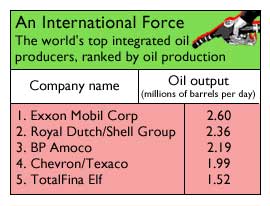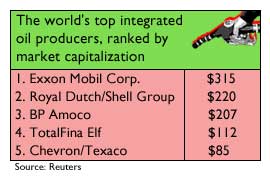|
Chevron taps Texaco
|
 |
October 16, 2000: 4:39 p.m. ET
Stock swap valued at $35B creates world's No. 4 integrated oil concern
|
NEW YORK (CNNfn) - Chevron Corp., the No. 3 U.S. oil company, sealed a much-rumored agreement Monday to buy No. 2 Texaco Inc. for $35.7 billion in stock plus debt, creating a powerful international oil concern rivaled only by a handful of companies worldwide.
|

|
VIDEO
|
|
 David O'Reilly, CEO of Chevron, and Peter Bijur, CEO of Texaco, chat with CNNfn about the deal.
David O'Reilly, CEO of Chevron, and Peter Bijur, CEO of Texaco, chat with CNNfn about the deal.
|
|
Real
|
28K
|
80K
|
|
Windows Media
|
28K
|
80K
|
|
The combination will create the world's fourth-largest integrated oil conglomerate with a market capitalization exceeding $85 billion and oil equivalent reserves equaling approximately 11.2 billion barrels.
The company, to be called ChevronTexaco, also will rank as the third-largest U.S. oil and gasoline producer, producing 1.1 million barrels of oil equivalent per day. It also likely will draw a stern eye from U.S. antitrust regulators, who have shown increasing reluctance to allow massive consolidation within the energy industry, particularly with oil prices on the rise.
Click here to find out how the merger will impact what you pay at the pump
"We would expect this transaction to be heavily scrutinized by the U.S. FTC (Federal Trade Commission) as well as certain individual states such as California and Texas," PaineWebber analyst Chris Stavros said in a research note. "[But] while we believe it is likely that regulators will require the companies to divest some assets before granting approval, we do not see this as standing in the way of the deal."
A year later, a better deal
Terms of the transaction call for Chevron (CHV: Research, Estimates) to swap 0.77 of a share for each outstanding Texaco share, a ratio that values White Plains, N.Y.-based Texaco (TX: Research, Estimates) at $64.87 per share, 18 percent above its closing price Friday.
Chevron shares fell as low as $79, or nearly 7 percent, Monday, but rebounded to close at $82, or down $2.25 for the day. Texaco gained $3.88 to $59.
Chevron also will assume approximately $8 billion in Texaco debt. Following the merger, Chevron shareholders will own about 61 percent of the new company and Texaco shareholders the rest. The agreement carries a break-up fee totaling nearly $1 billion, said Chevron spokesman Pierre Breber.
 The stock-swap agreement closely resembles one Chevron proposed more than a year ago, when the two oil companies first seriously entertained a merger. However, Texaco ultimately balked at that deal when Kenneth Derr, Chevron's then-chairman and CEO, insisted a Chevron executive run the combined company. The stock-swap agreement closely resembles one Chevron proposed more than a year ago, when the two oil companies first seriously entertained a merger. However, Texaco ultimately balked at that deal when Kenneth Derr, Chevron's then-chairman and CEO, insisted a Chevron executive run the combined company.
Monday's agreement calls for David O'Reilly, who succeeded Derr earlier this year, to serve as chairman and CEO of the combined company, which would be based at Chevron's current headquarters in San Francisco. Peter Bijur, Texaco's chairman and CEO, will become vice chairman of the new company and oversee the company's downstream business.
"We didn't have a deal a year ago," Bijur said, when asked about why the merger made more sense for Texaco now. "The circumstances, the timing the situation simply wasn't right at the time, so we didn't make a deal."
|

|
VIDEO
|
|
 CNNfn's Allan Dodds Frank takes a look at Chevron/Texaco deal.
CNNfn's Allan Dodds Frank takes a look at Chevron/Texaco deal.
|
|
Real
|
28K
|
80K
|
|
Windows Media
|
28K
|
80K
|
|
William Adams, senior energy analyst with Banc of America Capital Management, praised Monday's agreement, which offered similar terms as those proposed a year ago, but at a more attractive price for Chevron. (482K WAV) (482K AIF)
Stavros agreed, noting Texaco has taken several steps to clean up its balance sheet since last year.
"We believe this transaction represents an attractive longer-term growth opportunity for Chevron," he said. "Although the acquisition price is similar to Chevron's earlier offer, it appears to be more attractive compared to a year ago given Texaco's efforts to divest some less profitable non-core oil and gas properties ... as well as healthier oil and gas prices."
 Though slightly larger than Chevron, Texaco, with operations in more than 150 countries, has been viewed by analysts as an attractive takeover target because of its sluggish stock price in recent months. Investor pressure for a deal increased earlier this year after the blockbuster mergers that created Exxon Mobil (XOM: Research, Estimates) and BP Amoco (BP: Research, Estimates). Though slightly larger than Chevron, Texaco, with operations in more than 150 countries, has been viewed by analysts as an attractive takeover target because of its sluggish stock price in recent months. Investor pressure for a deal increased earlier this year after the blockbuster mergers that created Exxon Mobil (XOM: Research, Estimates) and BP Amoco (BP: Research, Estimates).
Still, despite Monday's agreement, reached late Sunday by the boards of both companies, several potential roadblocks remain.
With concerns about high gasoline prices and accusations that "Big Oil" is profiteering in the current environment while the number of competitors shrinks, the merger is expected to face tough scrutiny from regulators worried it might stifle competition, especially given Texaco's ties with Shell Oil Co.
 Texaco already has joint ventures in its refining and gasoline stations with Shell, the U.S. unit of European oil company Royal Dutch/Shell Group. Shell said Monday it is committed to the U.S. refining business and that it is talking with Texaco about a possible restructuring of those joint ventures. Texaco already has joint ventures in its refining and gasoline stations with Shell, the U.S. unit of European oil company Royal Dutch/Shell Group. Shell said Monday it is committed to the U.S. refining business and that it is talking with Texaco about a possible restructuring of those joint ventures.
But Chevron and Texaco officials painted their union as one that would actually help strengthen the U.S. marketplace and not hurt it because it would create a stronger U.S.-centric oil provider.
"The combination of the two companies creates a U.S.-based global enterprise that will join the ranks of the largest oil companies in the world," O'Reilly said. "We plan to be a powerful new competitor, a very strong U.S.-based competitor, which we think is very important in this age of worry about supplies here.
"It's acutely apparent to everyone in this country that energy supplies are important to the health of our country. This is an ideal time to address this issue and we are confident that the regulators will see it that way," he added.
Divestitures likely
Stavros said the most lively scenario would involve Texaco relinquishing its interest in Equilon, the research and manufacturing joint venture with Shell west of the Mississippi, and for both companies to divest some retail sites in Texas or other southwestern states.
"It would see to me the downstream assets of Texaco in the United States are the major issue here," said Ed Maran, an oil analyst with A.G. Edwards & Sons. "Generally speaking, the upstream generation and production company doesn't have any FTC concern."
Click here to read more about Chevron's negotiation course
The companies said they would soon submit a list of proposed divestitures to the FTC in hopes of expediting the approval process. The companies anticipate finalizing the deal within the next six to nine months, a timeframe that left some analysts skeptical.
"Their timing is a lot more aggressive than what we had been anticipating," said Tyler Dann, an oil analyst with Bank of America Montgomery. "I think that there are some regulatory hurdles that need to be jumped over, so in terms of actually getting the deal to the goal line, I think it could take some time to do that."
In their statement, the companies said they would cut 7 percent of their combined work force of 57,000 worldwide, or about 4,000 jobs, as they took steps to cut costs by about $1.2 billion a year after the merger.
The companies said that about $700 million of the expected cost savings would come from exploration and production activities. Combining corporate functions is expected to save about $300 million annually, and another $200 million in savings will come from other operations
Lehman Brothers Inc. is acting as financial adviser to Chevron while Credit Suisse First Boston and Morgan Stanley Dean Witter are advising Texaco. 
|
|
|
|
|
 |

|

